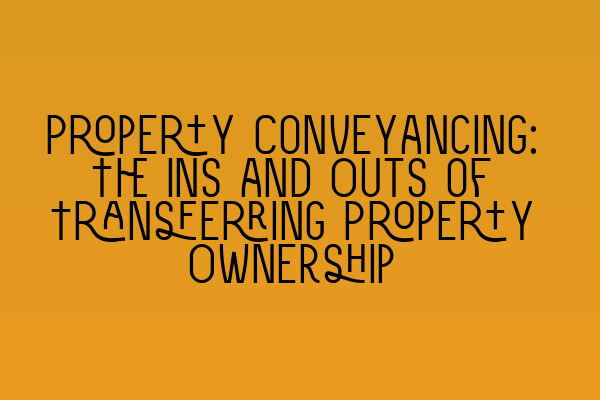Property Conveyancing: The Ins and Outs of Transferring Property Ownership
Welcome to the SQE Property Law & Land Law blog! In today’s post, we will delve into the intricacies of property conveyancing and explore the process of transferring property ownership. Whether you’re a first-time buyer, a property investor, or a legal professional seeking a deeper understanding of conveyancing, this article will provide you with valuable insights.
What is Property Conveyancing?
Property conveyancing refers to the legal process of transferring ownership of a property from one party to another. It involves a series of complex procedures and paperwork that ensure a smooth and lawful transfer of property ownership. Whether you’re buying or selling a property, it’s crucial to have a solid understanding of the conveyancing process.
The Role of a Conveyancing Solicitor
A conveyancing solicitor plays a vital role in the property transfer process. They act as the legal representative of their client, whether they are the buyer or the seller. Their main responsibilities include conducting property searches, drafting and reviewing contracts, liaising with other parties involved (such as mortgage lenders and surveyors), and ensuring that all legal obligations are met.
The Conveyancing Process Explained
The conveyancing process typically consists of several stages, including:
- Instruction: At this stage, you will engage a conveyancing solicitor to handle the legal aspects of the property transfer. Your solicitor will gather the necessary information and begin the necessary paperwork.
- Property Searches: Your solicitor will conduct various searches to gather information about the property. These searches may include local authority searches, environmental searches, and drainage searches, among others. The purpose of these searches is to identify any potential issues that may affect the property’s value or ownership.
- Contract Drafting: Once the necessary searches are complete, your solicitor will draft the contract of sale. This contract will outline the terms and conditions of the property transfer, including the purchase price, completion date, and any special conditions.
- Pre-Exchange: Before the exchange of contracts, your solicitor will negotiate any necessary amendments to the contract and ensure that all parties are in agreement. They will also conduct a final review of the property’s legal and financial status.
- Exchange of Contracts: Once all parties are satisfied with the terms of the contract, the contracts will be exchanged. At this point, the property sale becomes legally binding, and a deposit is usually paid.
- Completion: On the agreed completion date, the outstanding balance will be paid, and the property ownership will be transferred from the seller to the buyer. Your solicitor will handle the financial transactions and ensure that all necessary paperwork is completed.
- Post-Completion: After completion, your solicitor will register the property transfer with the relevant government authorities and settle any outstanding charges or debts.
The Importance of Property Searches
Property searches are a crucial part of the conveyancing process. They provide essential information about the property and its surroundings, which can affect its value or potential problems. It’s important to understand the different types of property searches and their significance. Our SQE Contract Law: Analyzing Landmark Cases and Influential Judicial Decisions article explores in detail the legal importance of property searches and how they impact property ownership.
Choosing the Right Conveyancing Solicitor
When it comes to property conveyancing, it’s critical to work with a reputable and experienced conveyancing solicitor. They will guide you through the process, ensuring that your rights and interests are protected. Understanding contractual capacity is also crucial in the conveyancing process, as it determines the legal capacity of individuals to enter into contracts. For a comprehensive overview of this topic, read our article on Understanding Contractual Capacity: Rights and Limitations.
Why You Need a Property Conveyancing Expert
While it’s possible to navigate the conveyancing process without professional assistance, it’s strongly recommended to seek the guidance of a property conveyancing expert. Joining our SQE Contract Law Webinars: Expert Insights and Guidance is an excellent way to gain valuable knowledge and advice from industry professionals. We also recommend our comprehensive SQE Prep: Mastering the Essentials of Contract Law course to enhance your understanding of the legal aspects of property conveyancing.
Conclusion
Property conveyancing is a complex process that requires careful attention to detail and legal expertise. By understanding the ins and outs of property conveyancing, you can navigate the process with confidence and ensure a smooth transfer of property ownership.
For more information on property conveyancing and other related legal topics, please explore our website. If you have any specific questions or require expert advice, our team of dedicated solicitors is here to assist you.
